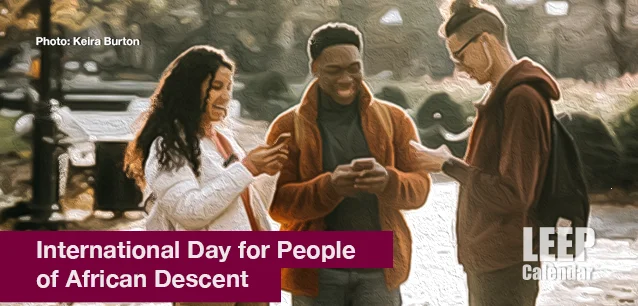 AD
AD
Today is: November 16
Scroll to explore events active on this date.
Additional Events on LEEP
LEEP INK FEATURES

August? Absolutely!
In August, we live through the Dog Days of Summer. It's hot and often humid, and those who can leave for better climates do. Down south, winter is in full force. August is also known as "the ...

In The Heat of July: July 2025 Events
Is it hot enough (or cold enough if you're below the equator) for you yet? There is actually a day for that! Like every month, I pick a diverse collection of events you may or may not know about. This ...

May Blooms: Events in May 2025
Along with October, May is one of the most densely packed months of the year. It's before the summer humidity and the last whole month of the school year. The weather is warming in t...
About the International Day for People of African Descent
Civil Rights , Africa
Ends: Aug 31, 2024
DESCRIPTION:
The United Nations will celebrate the International Day for People of African Descent for the first time on August 31, 2021. The observance aims to honor the remarkable contributions of the African diaspora globally and to eradicate all forms of discrimination against people of African descent. The UN asserts that all humans, irrespective of race, are born free and equal in dignity and rights, contributing significantly to the development and welfare of societies. The UN vehemently denounces racial superiority theories and any practices resulting in the discrimination of separate human races.
The UN strongly condemns the continuous violent practices and excessive use of force by law enforcement against Africans and people of African descent and the structural racism in criminal justice systems globally. The Organization recognizes the Transatlantic Slave Trade as one of humanity's darkest periods, asserting the dignity and equality of the victims of slavery, the slave trade, and colonialism, especially people of African descent in the African diaspora.
The year 2020 marked the midpoint of the International Decade for People of African Descent. Although some progress has been made legislatively and institutionally, racial discrimination, marginalization, and exclusion still plague people of African descent. The COVID-19 pandemic underscored the urgency of addressing deep-seated structural inequalities and systematic racism, especially in healthcare.
The murder of George Floyd in 2020 was a turning point in addressing these issues, sparking global protests against racism and racial discrimination, and leading to vital global discussions on racial justice. In response, the Human Rights Council adopted a resolution on protecting Africans and people of African descent against excessive use of force and other human rights violations by law enforcement. The High Commissioner for Human Rights then presented an agenda for transformative change towards racial justice and equality to the Human Rights Council.
VIDEOS
Currently, this event does not have supporting videos.
SUPPORTING DOCUMENTS
Currently, this event does not have supporting documents.
ADDITIONAL IMAGES
Currently, this event does not have supporting images.
Where would you like to go now?
 AD
AD


/footer-logo.svg)
